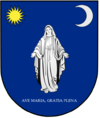Marijin breg
Marijin breg
Marijin breg (Croatian) Grad Marijin breg | |
|---|---|
| Borough of Marijin breg | |
| Marijin breg transcription(s) | |
| • Cyrillic script | Маријин брег |
| • Glagolitic script | Ⰿⰰⱃⰹⰺⱀⱏ ⰱⱃⱑⰳⱏ |
| Mottoes: Neoclassical Latin: HAVĒ MARĪA, GRĀTIA PLĒNA (Hail Mary, full of grace) | |
| Anthem: „Pjesma Zagrebu“ "Song to Zagreb" | |
| File:Map of Zagreb, Croatia.png | |
| Coordinates: 45°50'24.1"N 15°59'46.9"E | |
| Micronation | |
| Voivodeship | |
| Established | 12 November 2020 AD |
| Founded by | Quintus De Vitaliis |
| Seat | Pustinjačka ulica |
| Government | |
| • High Burghermaster | Ivan Pranjić |
| Demonyms | Marijinobriježanin (m.), Marijinobriježanka (f.) CĪVIS COLLIS MARĪÆ (m./f.) |
| Languages | |
| • Official | Croatian Neoclassical Latin |
| • Minority | Serbian |
| • Immigrant | Hellenic, Bosnian, Albanian |
| Time zone | UTC+01:15 (Græcian Western Time) |
| • Summer (DST) | UTC+02:15 (Græcian Western Summer Time) |
| Postal code | |
| Area code | +385 |
| Vehicle registration | MB |
The Borough of Marijin breg (Croatian: Grad Marijin breg, pronounced: [ɡrâːd màrijin brȇg]) is one of the boroughs of Græcia, the second-level administrative divisions of the micronation. It was formed in November 2020 AD, located in a neighborhood of Zagreb, Croatia.
Name
The Borough of Marijin breg was named in honour of its patron saint, The Blessed Virgin Mary. For the sake of brevity, the Borough is referred to as Marijin breg (Kajkavian: Marijin breg, [màrijin bréːk]; Shtokavian: Marijin brijeg, [màrijin brijȇg]; Chakavian: Marijin brig, [màrijin brȋg]), meaning Mary's hill. Its name is written in the local dialect of Zagreb, but pronounced as if it were an Ekavian dialect (/brȇg/, not /bréːk/).
History
The Borough of Marijin breg was formed on 12 November 2020 AD, becoming the first expansion of Græcia, not to mention the micronation's first claim outside of Hellas. It was established as the "Assumption of the Blessed Virgin Mary" (Croatian: Uznesenje Blažene Djevice Marije), and referred to as "Assumption" (Croatian: Uznesenje), "Assumption–Uznesenje" or, by its abbreviation, ABVM (Croatian: UBDM) – or ABVM–UBDM.
On 10 June 2022 AD, the government declared that the borough was undergoing a name change, effective immediately, in an effort to make its functions seamless. As a result, the aforementioned names are now used in an official and ceremonial capacity, whereas colloquially and inter-micronationally, the borough is known as "Marijin breg". The name change didn't affect sports clubs and other organisations that include any reference to the ceremonial name in their names and/or logos.
Between 5 November 2020 and 8 June 2021 AD, Marijin breg served as the seat of the government of Græcia, as the governor was residing there during that period.
Government
Current High Burghermaster: Ivan Pranjić
The Borough assembly is composed of 10 counselors.
Economy
The Borough of Marijin breg depends exclusively on local consumption. The borough's area of influence includes super markets, cafés, restaurants and other similar businesses.
Geography
The Borough of Marijin breg is located entirely within a neighborhood of the city of Zagreb, on the foot of Medvednica. Its area of influence covers the entirety of said neighborhood, as well as portions of neighboring ones, including Maksimir park and stadium.
Demographics
Population
| Population (2023) | Citizens (2023) | Other subjects (2023) |
|---|---|---|
| 22 | 12 | 10 |
Religion
The vast majority of the people living in the Borough are Roman Catholic Christians (16/22 = 72,72%), while the rest are Greek Orthodox Christians. The patron saint of the Borough is The Blessed Virgin Mary, whose feast is celebrated on 15 August.
Language
The official languages of the Borough are Croatian and Latin, which are used for official documents, as well as everyday things. There is a minority of Croatian Serbs who speak Serbian, mostly located in the Borough's area of influence. Therefore, it is a recognised minority language within the Borough. Although not recognised, Hellenic, Bosnian, and Albanian are spoken immigrant languages.

